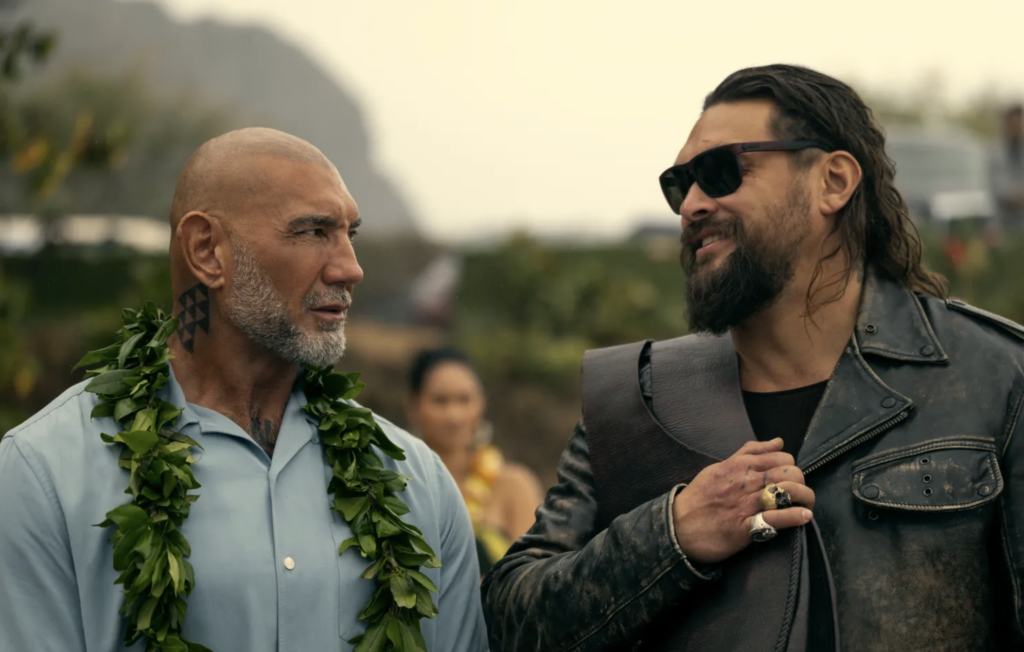The Year in Film: The Way He Lives Now

Novelist William Gibson once said, “You don’t meet the book when you meet the writer.” His adage applies only rarely to actors, though. Robert De Niro trained hard and put on weight to play Jake LaMotta, but there was never any mistaking the sighs and hand-wringings and tongue clicks for anyone’s but De Niro’s. Meryl Streep plays bossy editors and Polish war survivors with persuasive delicacy, but in David Letterman’s plush Late Show chair, she still tilts her head and laughs just like Sophie.
Daniel Day-Lewis is another matter. In his new role, as turn-of-the-century oil baron Daniel Plainview in Paul Thomas Anderson’s There Will Be Blood (due here in January), Day-Lewis portrays a man so contorted with greed that he can barely heave a laugh from his toxic throat. You might expect the man behind the mask to have at least some of Plainview’s fire or a flicker of that fixed, maniacal stare.
But he doesn’t. When Day-Lewis shows up on the patio of the Hotel Bel-Air in Los Angeles one November day for an interview, it’s a shock: There are the sharp green eyes, the slightly bent nose, the gray-flecked black hair, but there isn’t the faintest shadow of Plainview. When you meet Day-Lewis, to paraphrase Gibson, you don’t meet the characters. You don’t even meet the actor. You meet the place where the actor lives.
How does he do it? How does he make every nuance invented to express a character — Plainview’s compensating gait, for instance, meant to suggest a badly healed broken leg — appear to result from the character’s own long history rather than an actor’s contrivance?
“It’s a game,” he tells me. “It really is. It takes a long time from beginning to end. It’s a long and complicated game. But it’s a game. And it’s fun.”
It was more than 20 years ago that Day-Lewis played gay, working-class street punk Johnny in Stephen Frears’ My Beautiful Laundrette, then showed up as upper-class twit Cecil in A Room With a View. “Seeing these two performances side by side is an affirmation of the miracle of acting,” wrote a smitten Roger Ebert in The Chicago Sun-Times. “That one man could play these two opposites is astonishing.”
Four years later, his humane, heart-rending portrayal of Christy Brown in My Left Foot won him an Oscar. The consummate method actor, Day-Lewis prepared meticulously to play the cerebral-palsy-afflicted writer, slumping over in a wheelchair for so many months on end that he reportedly broke two ribs.
Almost never is it feasible, in advance of meeting an actor with a few decades of work behind him, to watch a whole career’s worth of films. With Day-Lewis, however, it’s possible because, in the 22 years he has been famous, he has appeared in only 14 films. Journalists, particularly in England, have often interpreted this as proof of Day-Lewis’ elitism or extremism, but it really only proves that, at 50, the actor leads a relatively normal life beyond movies, with hobbies and a wife and kids. He’s married to Rebecca Miller, daughter of Arthur, whom he met on the set of The Crucible in 1996; together they have two sons, Cashel, 5, and Ronan, 9. He also has another son with Isabelle Adjani, 12-year-old Gabriel-Kane, who lives with his mother. “There are more and more things to preoccupy me outside of the world of films,” he admits.
“Something that has been suggested on my behalf is that I live an almost bipolar existence, with the public life of filmmaking on one side and a sort of reclusive, almost misanthropic life on the other. But it never appears to me that there’s any chasm, any rift, between those two worlds. My life, to me, contains both the professional and the personal very easily. But because you tend to be written about when you’re, for whatever reason, in the public eye, then they depict you as having left and returned.
“But it’s not a return to me,” he continues. “I never went away. I never left myself. I simply need the time I spend not working in films, the time away, to do the work that I love to do in the way that I love to do it.”
The work Day-Lewis does begins with meticulous preparation, during which he lives, as much as possible, like the character he’s playing. Readying for There Will Be Blood was tricky. Though the film was eventually shot in Marfa, Texas, most of its action is set in Southern California from the turn of the last century through the 1920s. Day-Lewis lived in Ireland for the two years it took to get the movie financed — “an environment that was of no help to me whatsoever,” he says. Despite the London Guardian‘s speculation that the actor, given his penchant for physical research, was “out drilling for oil in his Wicklow back garden,” this time Day-Lewis did most of his preparation in his head.
He read letters written home by “men who were living in holes in the ground,” florid letters, “full of sentimentality, full of love and loss.” He pored over photographs of the period, “of these lads scooping up oil from the ground in buckets and saucepans and whatever they could take with them before drilling was developed,” and of the landscape of oil-rich Southern California pockmarked with oil fields.
He also read up on oil tycoon Edward Doheny (a name he pronounces Do-HAY-ny), who, like Plainview, was born in Fond du Lac, Wisconsin, and made his way west to a millionaire future in Los Angeles. (The book on which There Will Be Blood is loosely based, Upton Sinclair’s Oil!, is itself only loosely based on Doheny.)
“I’ve got a room at home where I can really daydream without being disturbed, and I suppose it’s there where things ferment,” Day-Lewis says. Things like Plainview’s voice came to him in pieces and parts, he says. Recordings from the Dust Bowl and from ’20s-era Fond du Lac proved less helpful than his own ear.
“I like to have the illusion that I can hear that voice before I’m able to speak with that voice,” he says. “I do use a little tape recorder. I talk to myself a lot. I try, without thinking about it, to have a sense of whether that voice belongs to me in my new life.” For Plainview, “I discarded a lot of ideas that didn’t work and a lot of possibilities. Finally, I just began to hear a voice, which seemed to be right. I couldn’t make the sounds initially. I could hear them but I couldn’t make them.
“We don’t choose our voices,” Day-Lewis adds. “So within the voice, there’s an expression of the very self.
“Do you really want to know about that?” Day-Lewis protests when I ask how he manages to live in character on a movie set. He looks down at his hands and laughs. He has just been profiled in a long New York Times Magazine cover story by Lynn Hirschberg. He’s reluctant to “gob off” even more about himself, not out of humility or standoffishness but out of a firm conviction that there should be other things to talk about, like what’s happening in Pakistan or Gaza. But like it or not, Day-Lewis has come here to gob off, and Paramount Pictures is paying for the hotel suite, and so he complies.
And, yes, I want to know: Did he eat, smoke and drink as Plainview even when the cameras weren’t rolling?
I should mention here that the way Day-Lewis sounds on the page — uttering clean, neat sentences off the cuff — isn’t really a fair representation of how he sounds in person. There are ums and ahs and pauses so long that it’s hard to resist finishing his sentences. He comes off neither overly learned nor haughty, only obdurately sincere, always checking himself to make sure that he means what he says. He interjects the name of the person he’s talking to as he speaks, as if to remind himself to treat as an individual each new interrogator lumbering through a dreary day of publicity.
All this affability makes it hard to believe that, as Hirschberg suggested, Day-Lewis so intimidated an actor on the There Will Be Blood set that Anderson had to replace him with Paul Dano halfway into the 60-day shoot. Day-Lewis seems confused by the story. “When Lynn mentioned that to me, I was genuinely surprised,” he says. “I didn’t believe it. I’d be very, very sorry if that were true. It appalled me to think that it might be true. It would never be my intention. Apart from everything else, it would be self-defeating to intimidate a colleague I was working with. No matter what the rivalry is, even if it’s murderous between those two characters, you’re in a partnership. You’re in a dance of some kind. And it’s absolutely vital that you work together.”
It is true that the actor originally cast in the role of young evangelical preacher Eli Sunday was recast two months into shooting. But Day-Lewis rejects the idea that his process caused the trouble. “I suppose I always hope there’s some sort of tacit understanding between myself and my colleagues that I work the way I do,” he admits. “I don’t expect them to work in the same way. I don’t mind what way they work in to arrive at what they’re trying to arrive at, as long as it doesn’t interfere with me. And I really try not to interfere with them in any way, and only ever encourage them to do what they need to do to find that thing.
“Just to return to that question,” he goes on, “it [the article] also kind of suggested that Leo [DiCaprio, Day-Lewis’ Gangs of New York co-star] felt the same way about me, and I just don’t think that’s true. Leo is a very strong, independent, serious actor. He’s wonderful. And he knows how it works. He may not have liked me during that time, I don’t know. We get on very, very well. I’m very fond of him. I’ve never discussed it with him. He never suggested to me that I was making his life difficult in any way. And I don’t think I was.”
Dano had already been indoctrinated in the Day-Lewis experience when he played the teenage Thaddius in The Ballad of Jack and Rose. After There Will Be Blood, he suggests that working with Day-Lewis is far less frightening than it is inspiring. “I think there’s a general feeling about Daniel that what he does is abnormal,” Dano says by phone from New York, where he’s appearing off-Broadway in The Things We Want. “But I have to say, when you’re there with him, it could not make more perfect sense. He’s doing what he has to do to give the best performance he can, and he has the nerve and passion and commitment to do it.”
It sounds like very serious work, this thing Day-Lewis does, but only when somebody writes about it. “I think I’ve been my own worst enemy in the past,” the actor admits, “judging by the stuff that’s been said about me. It sounds as if I’m being kind of dragged in a straitjacket to the set, kicking and screaming, struggling with a sort of reluctance.” What almost never comes through is the delight Day-Lewis takes in pretending so thoroughly to be somebody else.
“For my sense of continuity, I suppose I work in a certain way,” he says. “But it goes beyond that. It’s really about the sense of joy you have in having worked hard to imagine and discover and — one hopes — to create a world, an illusion of a world that other people might believe in because you believe in it yourself, a form of self-delusion. After achieving that, it seems far crazier to jump in and out of that world that you’ve gone to such pains to create. And it wouldn’t be my wish to do that because I enjoy being in there.
“It all sounds so grandiose, because of course you’re surrounded by reminders of the modern world everywhere you go. Part of the work you have to do is narrowing your focus, continually shutting out, closing off the peripheral vision that would take in the cables and the catering and the anoraks and so on and so forth. But I don’t find that hard to do — the power of self-delusion, I suppose — and it’s the joy that I find in that work, in inhabiting a world that you’ve taken such pains to imagine.
“Just like in other kinds of creative work, you get to enjoy that extraordinary sensation of timelessness, that time ceases to have any relevance or importance while you’re working. And within that, you experience the loss of the self. It’s a temporary thing but it’s a very invigorating thing, the loss of the self. It’s like you’re constantly trying to head off the conscious mind, which will, whether you like it or not, attempt to stay one step ahead of you,” he explains. “The imagination is on the frontline of the unconscious. And you do whatever you can do to engage that animal part of yourself, that instinctive part of yourself.”
A few years ago, Day-Lewis said in an interview that after decades of self-doubt — decades of asking himself whether he could be useful in his profession — he had finally realized a healthy question to ask oneself, enthusiastically and repeatedly: Is there any reason to be doing this?
“It came to me in the form of a revelation,” he explains. “My ambition for many years was to be involved in work that was utterly compelling to me, regardless of the consequences. But I worried a lot as a young man about where such and such a thing might take me. You’re encouraged to think that way. You’re supposed to build a career for yourself. But there’s no part of me that was able to do that. And, thank God, I was able to recognize it before I sort of went gray with anxiety.”
Far from building a career, he now sees himself starting all over each time he determines that he can be sufficiently useful to a director and accepts a role. “It’s absolutely new each and every time,” he says. “For all that you carry with you as you get older — and if you’ve had the good fortune to work in films that people have seen and, in some cases, liked — you carry with you the burden of expectation all that went before is meaningless. Absolutely meaningless. Because you’re a baby. From the moment you decide to go to work again, you’re a baby. You have to empty yourself if you’re going to be any kind of vessel at all.”
The beginner’s mind: Some people meditate for a lifetime to find it.
Day-Lewis laughs. “I don’t think I’ve achieved separation from the material world just yet,” he says. “The loss of myself happens in a place that’s very concrete.” Right — in the movies.




